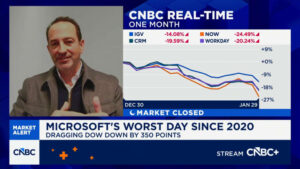This article is reprinted by permission from NextAvenue.org.
Debt has been linked to greater health risks for older adults, but not all debts affect your health, and the exact mechanism that causes health issues isn’t yet known. Still, studies show that some types of debt — specifically unsecured loans like credit-card balances — coincide with health issues, and others, typically mortgages, don’t.
Stacey Betts is a good example. Borrowing decisions she made years ago have, in one case, led to financial insecurity, worry and maybe even ill health while in another case her debt decisions have helped construct a safety net for the 66-year-old.
Also see: Study: These foods raise your risk of dementia — a lot
Student loan quicksand
Betts is still trying to pay off the loans she took out to finish college more than 20 years ago. At the time, student loan debt seemed like a ticket to a better life for her and her son. Now, it’s a source of anxiety that keeps her awake some nights.
She wonders if the years of worry are somehow related to her 11 surgeries or a breast cancer battle she fought over the past decade. Research suggests the answer might be yes.
Despite once using a windfall to pay a chunk of her student loan equal to her original principal, she still can’t get out from under payments and fears she never will. (President Biden’s student-debt forgiveness program approved her application to clear her loans, but it remains to be seen if the new Republican majority in the House of Representatives will pay for the program.)
The debt that offers Betts peace of mind is a mortgage on the condominium she bought in 2016. She has a 3.125% interest rate and no plans to pay her mortgage off early. The payment fits easily into her budget, and her central Massachusetts home has appreciated handsomely. That loan helps her sleep at night.
Linking debt and illness
Her experience lines up with research conducted by Stipica Mudrazija, principal research associate in the Income and Benefits Policy Center at the Urban Institute, and his colleagues. Their longitudinal study, “How Does Debt Shape Health Outcomes for Older Americans?” suggests that debt owed by people 55 and older can lead to health problems, both self-reported or doctor-diagnosed.
But not all debt is created equal. The kind associated with health problems tends to be debt we didn’t plan on — often medical debt or credit card debt. It’s debt not secured by collateral, like a house or car, and it includes student loans.
Betts’ student debt was manageable at first, but she deferred payments while raising her son. Interest accrued on the unpaid principal and interest, causing the total amount owed to mushroom; she has resumed making payments, but the total amount owed has grown so far there is no end in sight.
Car loans and mortgages, on the other hand, don’t happen without warning. “I think that people are better prepared to take on that kind of debt,” Mudrazija says. “There’s a lot of thinking going into it and they’re also mentally ready for it.”
Why is debt going up?
Prices are up, and so is debt. No big mystery there. But the bigger increase in debt among older people is part of a long-term trend. In 2001, less than one-quarter of households led by someone 65 or older had any credit card debt; by 2019, more than one-third did. Among people between 55 and 74, more than 40% had credit card debt.
In the recent past, home prices have soared, as has inflation. If your income isn’t going up as fast, or you’re living on a fixed income, fixed-rate debt can act as an emergency financial flotation device.
Debt that is affordable isn’t necessarily a bad thing. When interest rates were lower, many people bought or refinanced homes at mortgage rates that are lower than CD rates are now. That kind of debt, assuming it fits comfortably in your budget, can be good.
Unsecured debt, insecure life
But unsecured debt — which usually comes with adjustable interest rates that rise with inflation — is the stuff of nightmares. Interest can accumulate to the point where the amount you owe is more than the value of what you bought, which is a recipe for stress and anxiety.
Secured debt amounting to less than 80% of an asset’s value was not strongly associated with health difficulties. Interestingly, the people who have no debt do not have the best health outcomes, but Mudrazija says that’s because that group includes people whose credit and assets do not qualify them to borrow money. The very best health outcomes are for people who have high assets and no debt.
Secured debt has a limited (if any) effect on health, but unsecured debt — like credit card debt and student loans — has a substantial negative impact on health, Mudrazija’s research shows. Self-reported anxiety and stress were higher, as were doctor-diagnosed conditions including obesity, hypertension, diabetes, cognitive decline and cancer. The worst outcomes are for people with little money and lots of secured debt.
A healthier way to structure debt
Jill Fopiano, a Certified Financial Planner and president and CEO of O’Brien Wealth Partners, a boutique wealth management firm in Boston, suggests opening a home equity line of credit, or HELOC, before you retire.
“Even if you don’t draw on it, it’s like a piggy bank, honestly,” she says. “If you have a project that you need to do in your home or something like that, it’s there for you.”
HELOCs, which let you borrow against the equity in your house, can help you pay for unexpected expenses without paying high interest rates — if you have a fixed-rate HELOC. There’s a 10-year “draw” period when you can pull cash out and pay only the interest. When the draw period ends, you can no longer borrow against the equity in your house and must start repaying the amount you did borrow as well as interest on that amount.
Most of us, if we live long enough in retirement, may eventually spend more than we take in each month, and we may see the nest egg we had so carefully built for many years begin to shrink.
Tips to help you sleep at night
To postpone that day as long as possible and minimize anxiety when it finally arrives, Fopiano offers these tips for “sleep at night” borrowing:
- If you use a credit card, pay the entire balance due when the statement arrives every month. The interest rate on most credit cards is close to 20% now. If you decide to pay credit card debt with a lower-interest loan secured by your home, be very certain you can repay that loan.
- Try to think of your home as an asset, as opposed to a family treasure that must be passed down generations. “One of the things I’ve seen backfire is when our clients try to or decide to will properties to their children,” Fopiano says. “And you know, there’s one property and three children, four children and it becomes an issue of who uses it when and who pays for what, and it usually doesn’t work out well.”
- If you have unsecured debt that could be vanquished with a relatively small 401(k) loan, go ahead, Fopiano says. The concern that you are potentially losing years of compounding is less effective the closer you get to retirement.
To Fopiano, the ultimate sleep-at-night debt option is to open a home equity line of credit. You may hope you will never need to use it, but if you do, it can be comforting to know it’s there.
More research is needed
Mudrazija’s study includes a policy recommendation that would strongly encourage limiting unsecured debt among people close to retirement, as a way of promoting better health outcomes among older people. Still, Mudrazija hopes future research will show the mechanism that results in health issues, so that interventions can be found.
Betts also believes policy changes are needed, but she is finding ways to get by. She plans to continue to work at a community college, where she will have earned a pension by the time she turns 70. Between that and Social Security, she’ll be able to make up her monthly income, she hopes. Otherwise, she’ll try to work part time in her 70s.
Also read: Three hard lessons I learned after getting rejected for a personal loan
She sees her home as a source of financial stability and is thankful it has appreciated. She feel no obligation to try to leave it to someone else.
There’s no money in her budget for travel, but she acknowledges she chooses to live in relatively high-cost Massachusetts, where her friends are, and many of them are in a similar boat. Friendships and a feeling of autonomy affect health and well-being, too.
This article is reprinted by permission from NextAvenue.org, ©2023 Twin Cities Public Television, Inc. All rights reserved.
More from Next Avenue:
Bev O’Shea is a freelance writer specializing in personal finance topics. She is a mother of two adult children and lives in Georgia with her husband, cockapoo and calico. Read more of her work at bevoshea.com.
This post was originally published on Market Watch






